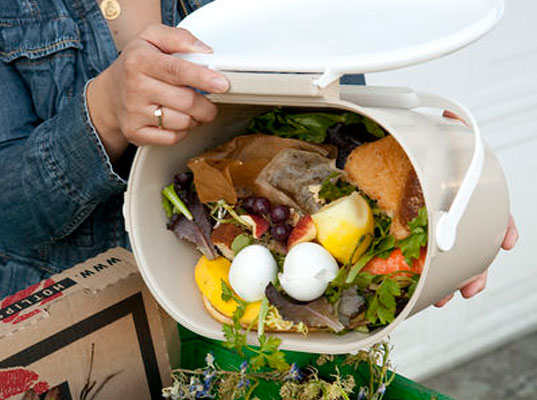
 Remember how annoyed we used to get at our parents for those long lectures on food wastage for throwing two morsels into the bin. We all know that we shouldn’t waste food, and how only the fortunate get to eat. That moral lecture was a standard response to our wastage of food. In the wake of environmental upheaval which is directly affecting our lives in the form of extreme climate, or non availability of some of our favourite greens; there can’t be a better time than now, to discuss and refresh a pertinent subject of food wastage. Apart from the moral guilt of wasting food; many few know about the harmful side effects of the same. The wastage of some billion tonnes of food per year is not only causing major economic losses but also harming the natural resources. A report on FAO was the first to analyse the impacts of global food wastage, looking at it to learn the consequences on the climate, water, land use and biodiversity. In simple words, studying the impact on environment.
Remember how annoyed we used to get at our parents for those long lectures on food wastage for throwing two morsels into the bin. We all know that we shouldn’t waste food, and how only the fortunate get to eat. That moral lecture was a standard response to our wastage of food. In the wake of environmental upheaval which is directly affecting our lives in the form of extreme climate, or non availability of some of our favourite greens; there can’t be a better time than now, to discuss and refresh a pertinent subject of food wastage. Apart from the moral guilt of wasting food; many few know about the harmful side effects of the same. The wastage of some billion tonnes of food per year is not only causing major economic losses but also harming the natural resources. A report on FAO was the first to analyse the impacts of global food wastage, looking at it to learn the consequences on the climate, water, land use and biodiversity. In simple words, studying the impact on environment.
According to the EPA, 31 million tons is thrown into landfills. Most of that produces methane as it rots; the gas is 25 times more potent a greenhouse gas than carbon dioxide. The numbers are so alarming that they can actually shock you. Did you know that one tonne of food waste is equivalent to 4.2 tonnes of CO2. FAO reports suggest that the food produce that is not consumed is responsible for adding 3.3 billion tonnes of greenhouse gases to the planet atmosphere.
Other than the environmental one, the economic consequences are also noteworthy. The producers of food wastage take a hitting of approx $750 billion annually, according to the report. In the wake of such losses, it is imperative for consumers, producers, agriculturalist, fishermen and supermarkets must take steps to reduce food wastage at every link of the human food chain. And where necessary, recycle and reuse it.
How can we reduce food loss? A few important pointers to look into..
Going by the trend, Developing countries suffer more food losses during agricultural production while most losses at the retail and consumer level is higher in middle and high income group. Statistics shows that higher percentage of wastage happens upstream, during production, post-harvest and storage.
Cereal wastage in Asia is a big problem, with major impacts on carbon emissions and water and land use. Rice eaters and producers should be careful about wastage, given its high methane emissions. While meat wastage volumes all over the world is comparatively low, the meat sector generates a substantial impact on the environment in terms of land occupation and carbon footprint, especially in high-income countries and Latin America, which in combination account for 80 percent of all meat wastage. Fruit wastage in a way leads to water waste in Asia, Latin America, and Europe, mainly as a result of extremely high wastage levels.
Similarly, large volumes of vegetable wastage in industrialized Asia, Europe, and South and South East Asia translates into a large carbon footprint for that sector.
- To reduce food wastage, it is essential to develop better food harvest, storage, processing, transport and retailing processes
- The loss of crops because of Harvest can be for; bad timing of and poor conditions during the harvest as well is inadequate techniques and equipment.
- Lack of good infrastructure for transportation, storage, cooling and marketing cause food to spoil, especially in hot climates. During transportation, a lot of food gets wasted.
- Both the private and public sectors need to increase investments to address such shortcomings; doing so will also have additional benefits for food security and mitigating climate change, land degradation and biodiversity erosion..
- Introducing new technologies and investing in the same can be a huge help towards reducing wastage.
- Examples of improved rice-storage bags which helped cut losses by 15% should be an inspiration and motivation for India. News reports have talked about rice grains being eaten by rats, unhealthy storage systems causing wastage.
- Often, food losses can be significantly reduced simply through training farmers in best practices.
- It is the duty of the government and nongovernmental helps to educate farmers about cooperatives and professional associations, which helps them understand the market, thereby, helping them plan and efficiently market their produce.
- For businesses and households, there needs to be better monitoring of the cause and to tap exactly where it happens.
- A sound communication is important to address the discrepancies between demand and supply are a major cause of food wastage. They can involve farmers not finding a market for products and leaving them to rot in the field; mothers cooking for five family members while only three actually make it to dinner; supermarkets downsizing product orders at the last minute, leaving producers with unsalable products; or restaurants overestimating demand and overstocking food supplies that go bad.
- Better food packaging, especially in developed countries, more environmentally-minded food retailing is needed.
- Rejection of food products on the basis of aesthetic or safety concerns is a major cause of food losses and waste.
- We, the consumers need to be more responsible. In developed countries, a significant part of total food wastage occurs at the consumer level.
- Recycling and reusing is the best way to reduce wastage. Redistributing safe surplus food to those in need represents the best option for dealing with food waste. Especially in a country like ours, where many go without a meal a day, it is inhuman to throw away food, rather than distributing it amongst people who would enjoy it. Aunty and Uncles, with the wedding season on, please distribute the leftovers from your daughter’s grand wedding. Don’t throw it in the bin, when you can satiate some hunger and in turn be blessed for it.
- Last but not the least, Governments need to pass legislations aimed at lowering food wastage. Governments should come out with policies and soft law measures, as well as decisive measures and legislations. Is the government listening?
By Dr. Arvind Kumar President India Water Foundation
*Your valuable comments/suggestions can be helpful in food security and restoring the ecosystem.



